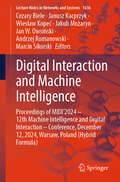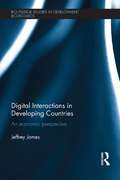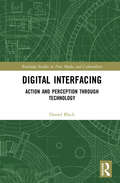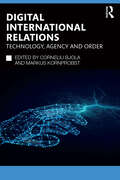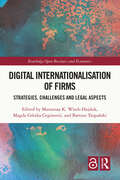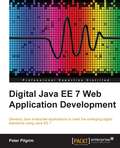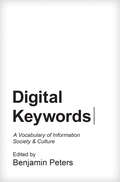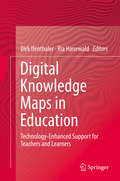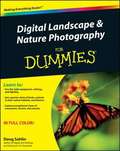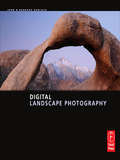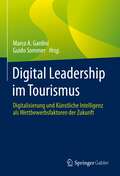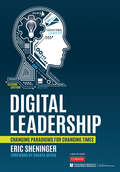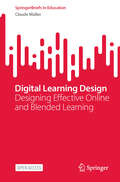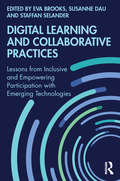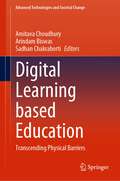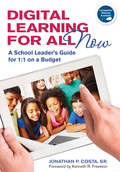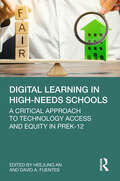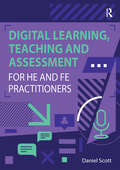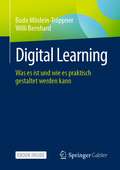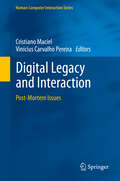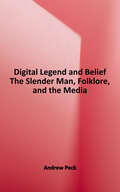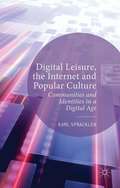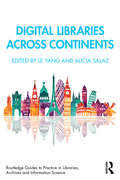- Table View
- List View
Digital Interaction and Machine Intelligence: Proceedings of MIDI’2024 – 12th Machine Intelligence and Digital Interaction – Conference, December 12, 2024, Warsaw, Poland (Hybrid Formula) (Lecture Notes in Networks and Systems #1636)
by Janusz Kacprzyk Jan W. Owsiński Cezary Biele Andrzej Romanowski Marcin Sikorski Wiesław Kopeć Jakub MożarynThis book presents the Proceedings of the 12th Machine Intelligence and Digital Interaction Conference, and it combines two disciplines of research. The rapid progress in artificial intelligence research and the widespread use of interactive technologies are fundamentally changing our daily lives. This has given rise to new social dynamics, compelling nations around the world to develop new insights and strategies. Addressing these changes effectively demands a multidisciplinary strategy, uniting experts from AI and human-computer interaction with both academic researchers and industry practitioners. The proceedings from the 2024 MIDI conference offer the latest research on the convergence of these two formerly separate fields.
Digital Interactions in Developing Countries: An Economic Perspective (Routledge Studies in Development Economics #99)
by Jeffrey JamesJeffrey James is one of the relatively few academics to have systematically taken on the topic of IT and development. In this timely book he undertakes a methodological critique of prominent topics in the debate. Challenging the existing literature by international and governmental institutions, the book looks not only at the digital divide but also at issues such as digital preparedness, leapfrogging and low-cost computers. James also raises important issues which have been largely neglected in the literature, such as the implications for poverty in developing countries and the macroeconomics of mobile phones. The book argues that benefits from IT are captured in a different form in developing as opposed to developed countries. In the latter, gains come from technology ownership and use, whereas in the former, benefits cannot be captured as much in this way because ownership is more limited. Interestingly, the author shows that developing countries have responded to this distinction with a series of local innovations which are often low-cost and pro-poor. This finding contradicts the widely held view that poor countries are unable to generate major innovations within their own borders. Accessible and clearly written, this book will be of great interest to scholars of development economics and development studies, and is relevant to both policy-makers and academics.
Digital Interfacing: Action and Perception through Technology (Routledge Studies in New Media and Cyberculture)
by Daniel BlackThis book takes the interface – or rather to interface, a process rather than a discrete object or location – as a concept emblematic of our contemporary embodied relationship with technological artefacts. The fundamental question addressed by this book is: How can we understand what it means to perceive or act upon the world as a body–artefact assemblage? Black works to clarify the role of artefacts of all kinds in human perception and action, then considers the ways in which new digital technologies can expand and transform this capacity to change our mode of engagement with our environment. Throughout, the discussion is grounded in specific technologies – some already familiar and some still in development (e.g. new virtual reality and brain–machine interface technologies, natural user interfaces, etc.). In order to develop a detailed, generalizable theory of how we interface with technology, Black assembles an analytical toolkit from a number of different disciplines, including media theory, ethology, clinical psychology, cultural theory, philosophy, science and technology studies, cultural history, aesthetics and neuroscience.
Digital International Relations: Technology, Agency and Order (Routledge Studies in Conflict, Security and Technology)
by Corneliu Bjola Markus KornprobstThis book analyses how digital transformation disrupts established patterns of world politics, moving International Relations (IR) increasingly towards Digital International Relations. This volume examines technological, agential and ordering processes that explain this fundamental change. The contributors trace how digital disruption changes the international world we live in, ranging from security to economics, from human rights advocacy to deep fakes, and from diplomacy to international law. The book makes two sets of contributions. First, it shows that the ongoing digital revolution profoundly changes every major dimension of international politics. Second, focusing on the interplay of technology, agency and order, it provides a framework for explaining these changes. The book also provides a map for adjusting the study of international politics to studying International Relations, making a case for upgrading, augmenting and rewiring the discipline. Theory follows practice in International Relations, but if the discipline wants to be able to meaningfully analyse the present and come up with plausible scenarios for the future, it must not lag too far behind major transformations of the world that it studies. This book facilitates that theoretical journey. This book will be of much interest to students of cyber-politics, politics and technology, and International Relations.
Digital Internationalisation of Firms: Strategies, Challenges and Legal Aspects (Routledge Open Business and Economics)
by Witek-Hajduk, Marzanna K. Magda Górska Grginović Bartosz TargańskiDigital Internationalisation of Firms offers a comprehensive examination of the digital outward internationalisation of firms, focusing on both Internet-based and Internet-enabled businesses, including SMEs and large enterprises. This monograph provides in-depth analysis of the processes, modes, and strategies firms employ to expand internationally in the digital age. It also addresses key challenges, including legal aspects of cross-border e-commerce (CBEC), making it a vital resource for those navigating the complexities of global digital markets. This book offers a multifaceted approach to digital internationalisation, covering theoretical perspectives, practical strategies, and empirical evidence. It provides valuable insights into e-consumer behavior, big data, and sustainability challenges. The inclusion of legal considerations, such as consumer rights, tax regulations, and intellectual property protection, distinguishes this work from other publications in the field.Readers will gain a holistic understanding of the digital internationalisation process, from strategy formulation to navigating legal hurdles, and the book is ideal for academics, researchers, and advanced students in international business, marketing, and law. It also serves as a valuable resource for business managers, advisors, and policymakers seeking to understand the intricacies of digital internationalisation and the legal frameworks that influence cross-border e-commerce.
Digital Java EE 7 Web Application Development
by Peter PilgrimDevelop Java enterprise applications to meet the emerging digital standards using Java EE 7 About This Book * Build modern Java EE web applications that insert, update, retrieve, and delete customer data with up-to-date methodologies * Delve into the essential JavaScript programming language and become proficient with front-end technologies that integrate with the Java platform * Learn about JavaServer Faces, its lifecycle, and custom tags, and build exciting digital applications with the aid of handpicked, real-world examples Who This Book Is For If you are a professional Java engineer and want to develop well-rounded and strong Java Web Development skills, then this book is for you. What You Will Learn * Understand and apply updated JavaServer Faces key features including HTML5 support, resource library constructs, and pass through attributes * Build web applications that conform to digital standards and governance, and leverage the Java EE 7 web architecture * Construct modern JSF Forms that apply validation, add AJAX for immediate validation, and write your own validators * Augment a traditional web application with JSF 2.2 Flow Beans and Flow Scope Beans * Program single page applications including AngularJS, and design Java RESTful back-end services for integration * Utilize modern web frameworks such as Bootstrap and Foundation in your JSF applications * Create your own JSF custom components that generate reusable content for your stakeholders and their businesses In Detail Digital Java EE 7 presents you with an opportunity to master writing great enterprise web software using the Java EE 7 platform with the modern approach to digital service standards. You will first learn about the lifecycle and phases of JavaServer Faces, become completely proficient with different validation models and schemes, and then find out exactly how to apply AJAX validations and requests. Next, you will touch base with JSF in order to understand how relevant CDI scopes work. Later, you'll discover how to add finesse and pizzazz to your digital work in order to improve the design of your e-commerce application. Finally, you will deep dive into AngularJS development in order to keep pace with other popular choices, such as Backbone and Ember JS. By the end of this thorough guide, you'll have polished your skills on the Digital Java EE 7 platform and be able to creat exiting web application. Style and approach This book takes a step-by-step and detailed approach, coaching you through real-world scenarios. The book's style is designed for those who enjoy a thorough educational approach.
Digital Keywords: A Vocabulary of Information Society and Culture
by Benjamin PetersIn the age of search, keywords increasingly organize research, teaching, and even thought itself. Inspired by Raymond Williams's 1976 classic Keywords, the timely collection Digital Keywords gathers pointed, provocative short essays on more than two dozen keywords by leading and rising digital media scholars from the areas of anthropology, digital humanities, history, political science, philosophy, religious studies, rhetoric, science and technology studies, and sociology. Digital Keywords examines and critiques the rich lexicon animating the emerging field of digital studies. This collection broadens our understanding of how we talk about the modern world, particularly of the vocabulary at work in information technologies. Contributors scrutinize each keyword independently: for example, the recent pairing of digital and analog is separated, while classic terms such as community, culture, event, memory, and democracy are treated in light of their historical and intellectual importance. Metaphors of the cloud in cloud computing and the mirror in data mirroring combine with recent and radical uses of terms such as information, sharing, gaming, algorithm, and internet to reveal previously hidden insights into contemporary life. Bookended by a critical introduction and a list of over two hundred other digital keywords, these essays provide concise, compelling arguments about our current mediated condition. Digital Keywords delves into what language does in today's information revolution and why it matters.
Digital Knowledge Maps in Education
by Dirk Ifenthaler Ria HanewaldDigital knowledge maps are 'at a glance' visual representations that enable enriching, imaginative and transformative ways for teaching and learning, with the potential to enhance positive educational outcomes. The use of such maps has generated much attention and interest among tertiary education practitioners and researchers over the last few years as higher education institutions around the world begin to invest heavily into new technologies designed to provide online spaces within which to build resources and conduct activities. The key elements of this edited volume will comprise original and innovative contributions to existing scholarship in this field, with examples of pedagogical possibilities as they are currently practiced across a range of contexts. It will contain chapters that address, theory, research and practical issues related to the use of digital knowledge maps in all aspects of tertiary education and draws predominantly on international perspectives with a diverse group of invited contributors. Reports on empirical studies as well as theoretical/conceptual chapters that engage deeply with pertinent questions and issues raised from a pedagogical, social, cultural, philosophical, and/or ethical standpoint are included. Systematic literature reviews dealing with digital knowledge mapping in education are also an integral part of the volume.
Digital Landscape & Nature Photography For Dummies
by Doug SahlinStep-by-step instruction on creating beautiful nature and landscape portraits This eye-popping guide walks you through the nitty gritty of how to take memorable and stunning landscape and nature photos. Packed with constructive advice and a good dose of friendly handholding, this full-color and extra large-trim beginner guide escorts you through the basics of photography and explains how to apply those fundamentals when taking high-quality photos. Walks you through the basics of photography and details how you can apply those skills to nature and landscape photography Zeroes in on ways to sharpen your skills by adjusting exposure, composition, and lighting in order to get the best results Explores the most popular landscape themes and describes how to capture them, including forests, mountains, crashing waves, and sunsets Shares tips on processing photos, making common repairs, and finding inspiration Digital Landscape and Nature Photography For Dummies investigates the most popular nature themes and describes how to capture them, including birds, animals in the wild, animals in captivity, flowers, and insects.
Digital Landscape Photography (Digital Photography Ser.)
by John and GerlachPhotographing landscape with a film camera is different than with a digital camera. There are several books on the market that cover landscape photography, but none of them are specifically for the digital photographer. This book is what you are looking for! Digital Landscape Photography covers:* equipment such as accessories and lenses* exposure from shutter speed to common mistakes* shooting * light and its importance* composing your perfect photo* printing* and a special section on specific subjects such as waterfalls and sunrisesDigital Landscape Photography, written by experts that have been shooting outdoors for decades, is a fresh look at current ways to shoot landscapes by making the most of digital format.
Digital Leadership im Tourismus: Digitalisierung und Künstliche Intelligenz als Wettbewerbsfaktoren der Zukunft
by Marco A. Gardini Guido SommerDieses Buch bietet einen Überblick über den State of the Art zum Thema Digitalisierung und Künstliche Intelligenz im Tourismus und in den damit verbundenen wesentlichen Gestaltungs- und Handlungsfeldern. Die Autoren diskutieren Entwicklungen in folgenden Kontexten: digitale Transformation, digitale Geschäftsmodelle, digitaler Wettbewerb, digitales Mindset und digitale Führungskompetenzen. Außerdem werden Fragen zur Rolle der Digitalisierung und Künstlichen Intelligenz im Spannungsfeld zwischen Effektivität, Effizienz und Ethik im Kontext einer Digital-Leadership-Perspektive betrachtet. Die instrumentelle und inhaltliche Bandbreite digitaler Technologien und digitaler Arbeitsformen in verschiedenen touristischen Teilbranchen und deren Akteure werden beleuchtet und es wird gezeigt, wie in diesem Themenkomplex Veränderung erfolgreich gestaltet werden kann. Denn Digitalisierung und Künstliche Intelligenz als Treiber des zukünftigen Unternehmenserfolgs sind einerseits Top-Themen in zahlreichen touristischen Branchen, andererseits zeigen viele aktuelle Unternehmenskonzepte, dass das Thema bislang für den Tourismussektor kaum analysiert und systematisiert wurde und in der Praxis vielfach unzureichend konzeptionell und organisatorisch verankert ist.Der Autoren-Mix aus Wissenschaft und Unternehmenspraxis macht den Sammelband zu einem Nachschlagewerk für jeden, den das Thema Digitalisierung und Künstliche Intelligenz im Tourismus bewegt.
Digital Leadership: Changing Paradigms for Changing Times
by Eric C. SheningerLead for efficacy in these disruptive times! Just as the digital landscape is constantly evolving, the second edition of Digital Leadership moves past trends and fads to focus on the essence of leading innovative change in education now and in the future. As society and technology evolve at what seems a dizzying pace, the demands on leaders are changing as well. With a greater emphasis on leadership dispositions, this revamped edition also features New structure and organization emphasizing the interconnectivity of the Pillars of Digital Leadership to drive sustainable change Innovative strategies and leadership practices that enhance school culture and drive learning improvement Updated vignettes from digital leaders who have successfully implemented the included strategies New online resources, informative graphics, and end of chapter guiding questions Now is the time to embrace innovation, technology, and flexibility to create a learning culture that provides students with 21st century critical competencies!
Digital Leadership: Changing Paradigms for Changing Times
by Eric C. SheningerLead for efficacy in these disruptive times! Just as the digital landscape is constantly evolving, the second edition of Digital Leadership moves past trends and fads to focus on the essence of leading innovative change in education now and in the future. As society and technology evolve at what seems a dizzying pace, the demands on leaders are changing as well. With a greater emphasis on leadership dispositions, this revamped edition also features New structure and organization emphasizing the interconnectivity of the Pillars of Digital Leadership to drive sustainable change Innovative strategies and leadership practices that enhance school culture and drive learning improvement Updated vignettes from digital leaders who have successfully implemented the included strategies New online resources, informative graphics, and end of chapter guiding questions Now is the time to embrace innovation, technology, and flexibility to create a learning culture that provides students with 21st century critical competencies!
Digital Learning Design: Designing Effective Online and Blended Learning (SpringerBriefs in Education)
by Claude MüllerThis is an open access book. The shift from traditional teaching to digital learning presents a significant challenge for many educators. Navigating the complexities of digital course designs can often lead to suboptimal learning experiences that fail to engage learners effectively. Digital Learning Design: Designing Effective Online and Blended Learning aims to address this challenge by offering a comprehensive guide that combines cognitive science principles with practical design strategies. This book equips learning professionals—including trainers, teachers, and digital learning experts—with the knowledge and tools needed to create impactful and attractive online and blended learning environments to foster both meaningful engagement and knowledge retention in today&’s digital landscape.
Digital Learning and Collaborative Practices: Lessons from Inclusive and Empowering Participation with Emerging Technologies
by Eva Brooks Staffan Selander Susanne DauDigital Learning and Collaborative Practices offers a comprehensive overview of design-based, technology-enhanced approaches to teaching and learning in virtual settings. Today’s digital communications foster new opportunities for sharing culture and knowledge while also prompting concerns over division, disinformation and surveillance. This book uniquely emphasises playful, collaborative experiences and democratic values in a variety of environments—adaptive, augmented, dialogic, game-based and beyond. Graduate students and researchers of educational technology, the learning sciences and interaction design will discover rich theories, interventions, models and approaches for concretising emerging practices and competencies in digital learning spaces.
Digital Learning based Education: Transcending Physical Barriers (Advanced Technologies and Societal Change)
by Arindam Biswas Amitava Choudhury Sadhan ChakrabortiThis book presents the systematic evolution of digitized education: trends, advances, challenges encountered and their solutions toward the use of advanced technologies. The book mainly covers variety of areas such as blended learning in modern education, flipped classroom, ICT-based education, digital transformation of education. Explosion of information and communication technologies has transformed the way we live, learn, work and socialize. This heavy intervention of technologies in the modern world has triggered us to think how we engage and interact with each other and how we make use of these digital tools and communications channels. And consequent upon which societies are transforming into digitized education where datafication, platformization and algorithmic governance are a common vocabulary.
Digital Learning for All, Now: A School Leader's Guide for 1:1 on a Budget
by Jonathan P. CostaDesigning the practically paperless classroom Imagine students carrying mobile devices instead of a backpack. This breakthrough guide shows educators how to affordably transform schools into digital learning centers. Jonathan P. Costa, Sr. outlines a step-by-step road map of solutions for overcoming budget and systems barriers and moving forward with a sense of urgency. His field-tested strategies show how to: Acquire and pay for necessary equipment; Save money by utilizing open source, crowd sourcing, and Bring Your Own Device; Align instruction, assessment, curriculum, and professional development for a 21st century learning environment. A content-rich companion website provides adaptable tools, step-by-step guidance, resources, and access to an online interactive community.
Digital Learning in High-Needs Schools: A Critical Approach to Technology Access and Equity in PreK-12
by Heejung An David A. FuentesDigital Learning in High-Needs Schools examines the challenges and affordances that arise when high-needs school communities integrate educational technologies into their unique settings. Although remote, blended, and networked learning are ubiquitous today, a number of cultural, economic, and political realities—from the digital divide and digital literacy to poverty and language barriers—affect our most vulnerable and underresourced teachers and students. This book uses critical theory to compassionately scrutinize and unpack the systemic issues that impact high-needs schools’ implementation of digital learning tools. Incisive sociocultural analyses across fifteen original chapters explore the intersection of society, technology, people, politics, and education in high-needs school contexts. Informed by real-world cases pertaining to technology infrastructure, formative feedback, Universal Design for Learning, and more, these chapters illuminate how best practices emerge from culturally responsive and context-specific foundations.
Digital Learning in High-Needs Schools: A Critical Approach to Technology Access and Equity in PreK-12
by Heejung An David A. FuentesDigital Learning in High-Needs Schools examines the challenges and affordances that arise when high-needs school communities integrate educational technologies into their unique settings. Although remote, blended, and networked learning are ubiquitous today, a number of cultural, economic, and political realities—from the digital divide and digital literacy to poverty and language barriers—affect our most vulnerable and underresourced teachers and students. This book uses critical theory to compassionately scrutinize and unpack the systemic issues that impact high-needs schools’ implementation of digital learning tools. Incisive sociocultural analyses across fifteen original chapters explore the intersection of society, technology, people, politics, and education in high-needs school contexts. Informed by real-world cases pertaining to technology infrastructure, formative feedback, Universal Design for Learning, and more, these chapters illuminate how best practices emerge from culturally responsive and context-specific foundations.
Digital Learning, Teaching and Assessment for HE and FE Practitioners
by Daniel ScottAn accessible, practical and up-to-date book on digital learning and teaching, relevant for all those involved in teaching and assessment in higher and further education (HE and FE), whatever your academic or vocational specialism. Fully supports learners in developing skills for the new Diploma in Teaching (Further Education and Skills) qualification . It is essential reading for HE or FE practitioners, or those undertaking level 3, 4 and 5 qualifications in Education and Training, Postgraduate Certificates in Education (PGCEs), Certificates in Education (CertEds) and Postgraduate Certificates in Academic Practice (PGCAPs), as well as those in learning technologist roles. The impact of the Covid-19 pandemic has highlighted the importance of understanding and developing your digital capabilities as a basic competence in order to embrace current digital technologies and pedagogies to improve student outcomes. This book provides you with the practical knowledge and skills required to source and apply technology enhanced learning, teaching and assessment (TELTA) and adapt traditional learning and teaching materials and approaches for an online environment. It is designed around each aspect of the teaching and training cycle – identifying needs, planning and designing, delivering and facilitating, assessing and evaluating – and also includes: • how to build a positive and effective relationship with digital technology; • guidance on topics such as selecting appropriate digital technologies and creating digital and online activities, resources and assessments; • an emphasis on digital well-being and accessibility issues, and digital leadership; • ways of keeping up to date and continuing professional development.
Digital Learning: Was es ist und wie es praktisch gestaltet werden kann
by Bodo Möslein-Tröppner Willi BernhardDieses Buch gibt dem Leser einen Einblick in die vielfältigen Möglichkeiten, die das Digital Learning bietet. Diese kann er sogleich ausprobieren und selber anwenden. Die Autoren zeigen, wie sich 360-Grad-Lernen im virtuellen Raum umsetzen lässt (Immersive Learning) oder welche nützlichen digitalen Tools beim Lernen und in der virtuellen Zusammenarbeit (Digital Collaboration) verwendet werden können. Der Einsatz der Blockchain-Technologie in der Bildung wird genauso behandelt wie die Umsetzung praktischer digitaler Unterrichtsformen wie der Hybridunterricht als Lernform der Zukunft. Einen weiteren Schwerpunkt bildet die Künstliche Intelligenz (KI) im Digital Learning. Dazu zählen die Anwendung digitaler Sprachassistenten und wissensbasierter Applikationen zur Lösungsfindung ebenso wie die Überprüfung von Home-Based-Prüfungen. Ergänzt werden die vielfältigen Möglichkeiten des digital unterstützten Lernens durch die Anwendung des Digital Storytelling und des spielbasierten Lernens. Nach dem Lesen des Buchs weiß der Leser, was Digital Learning ist und wie es gestaltet werden kann. Für die verschiedensten Ideen und Anforderungen, die sich aus der individuellen Lern- bzw. Lehrsituation ergeben, finden sich einfach umsetzbare digitale Lösungen.
Digital Legacy and Interaction
by Cristiano Maciel Vinícius Carvalho PereiraThe views of leading researchers on the emerging topic of post-mortem digital legacy and posthumous interaction are explored in this book which combines the technical, cultural and legal aspects associated with this new branch of HCI. The technical aspects of emerging technologies, both for the web and mobile platforms, are analysed and useful information is provided for system development, requirements engineering, and data management and storage. The authors address the cultural aspects of virtual identity, ethical problems, cross-culture differences regarding memories and death, bereavement, taboos and beliefs, and the visual/verbal representations of death. The legal aspects covered include regulation, property, privacy and conflicts between international and local jurisdictions. The coverage of Digital Legacy and Interaction: Post-Mortem Issues is relevant to the development of systems that consider the influence of death, bereavement and mortality on Human Computer Interaction. The interdisciplinary approach that guides this book is intended to foster enriching and innovative discussions amongst HCI scholars and professionals. Cristiano Maciel and Vinícius Carvalho Pereira are researchers at LAVI (Laboratory of Interactive Virtual Environments) and professors at UFMT (Federal University of Mato Grosso, Brazil).
Digital Legend and Belief: The Slender Man, Folklore, and the Media
by Andrew PeckThe internet brings new urgency to the study of folklore. The digital networks we use daily amplify legends' capacity to spread swiftly, define threats, and inform action. Using the case of a particularly popular digital bogeyman known as the Slender Man, Andrew Peck brings the study of legends into the twenty-first century. Peck explains not only how legends circulate in the digital swirl of the internet but also how the internet affects how legends seep into our offline lives and into the mass media we consume. What happens, he asks, when legends go online? How does the internet enable the creation of new legends? How do these ideas go viral? How do tradition and technology interact to construct collaborative beliefs? Peck argues that the story of the Slender Man is really a story about the changing nature of belief in the age of the internet. Widely adopted digital technologies, from smartphones to social media, offer vast potential for extending traditional and expressive social behaviors in new ways. As such, understanding the online landscape of contemporary folklore is crucial for grasping the formation and circulation of belief in the digital age. Ultimately, Peck argues that advancing our comprehension of legends online can help us better understand how similar belief genres like fake news, conspiracy theories, hoaxes, rumors, meme culture, and anti-expert movements are enabled by digital media.
Digital Leisure, the Internet and Popular Culture
by Karl SpracklenThe emergence of the internet as a digital leisure space has been either ignored by leisure scholars, or breathlessly heralded as the arrival of a new age. This book explores the impact of the internet on leisure and leisure studies, considering the ways in which digital leisure spaces and activities have become part of everyday leisure. Examining the growth and importance of the internet in shaping the meaning and purpose of leisure and popular culture, Spracklen analyses whether digital leisure spaces and activities are just like any other forms of leisure. That is, that they are forms of leisure where the agency of individual users takes place in the shadow of the instrumental interests of global capitalism and nation-states. Covering a range of issues from social media and file-sharing, to commodification and romance on the Internet, this book presents new theoretical directions for digital leisure.
Digital Libraries Across Continents (Routledge Guides to Practice in Libraries, Archives and Information Science)
by Le Yang Alicia SalazDigital Libraries Across Continents illustrates how digital librarianship practitioners and scholars digitize, exhibit, and preserve their cultural heritage, and how these practices may be influenced by the policy, economic, and sociocultural environments in which they are developed.Including scholarly articles, case studies, examples of best practice, and conceptual essays solicited from different continents, this book provides an overview of the status quo of digital libraries around the globe. The case studies examine how macro-level policy, funding, and social priorities influence the development of digital libraries. The volume offers a deeper understanding of the similarities and differences between libraries in different countries and the ways in which they view, foster, develop, and sustain digital librarianship. Chapters within the book examine systems, standards, workflows, content, protocol, social and policy environments, culture, metadata, and more, through a series of case studies provided by practitioners working in these settings. Taking a comparative international approach, the book promotes the development of inclusive, accessible, and sustainable digital libraries that serve a global human knowledge endeavor.Digital Libraries Across Continents provides a wide-ranging examination of issues in cross-border digital library contexts. It will be essential reading for library practitioners, as well as information scientists and educators.
